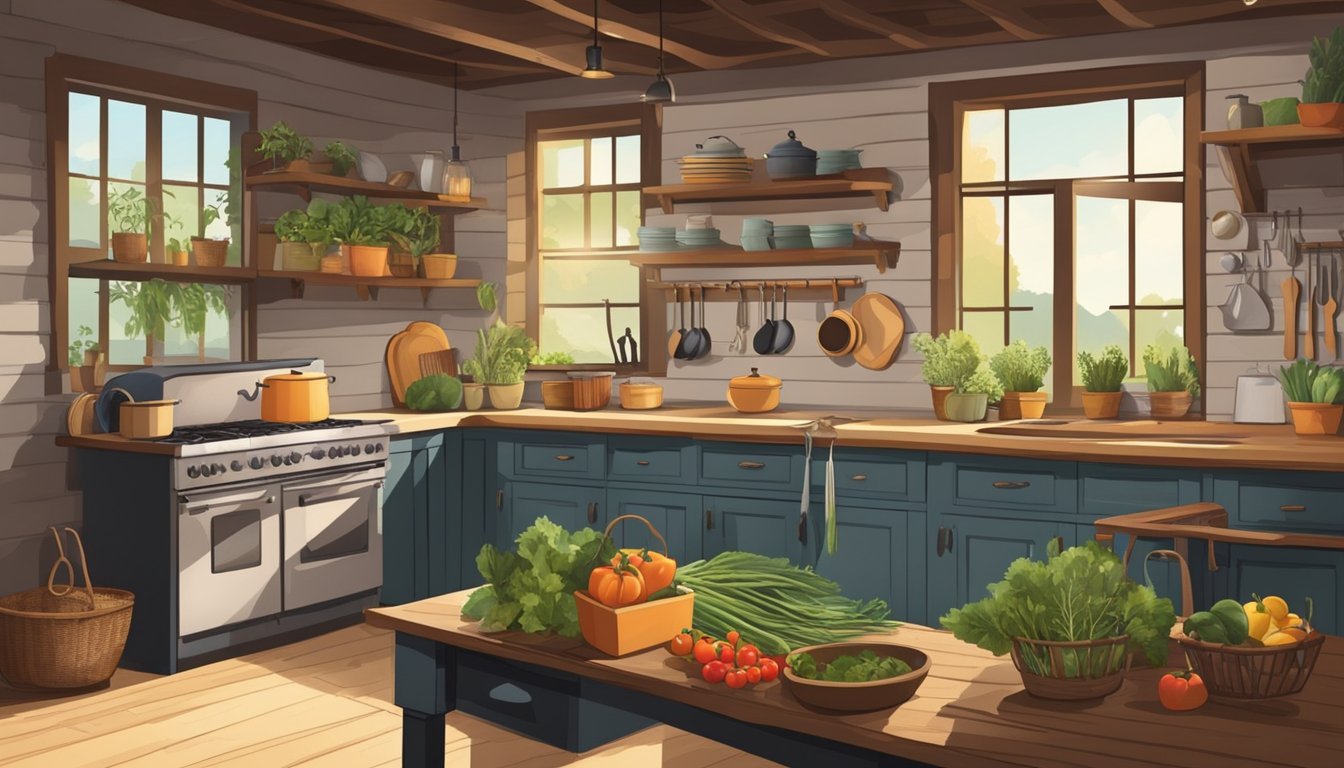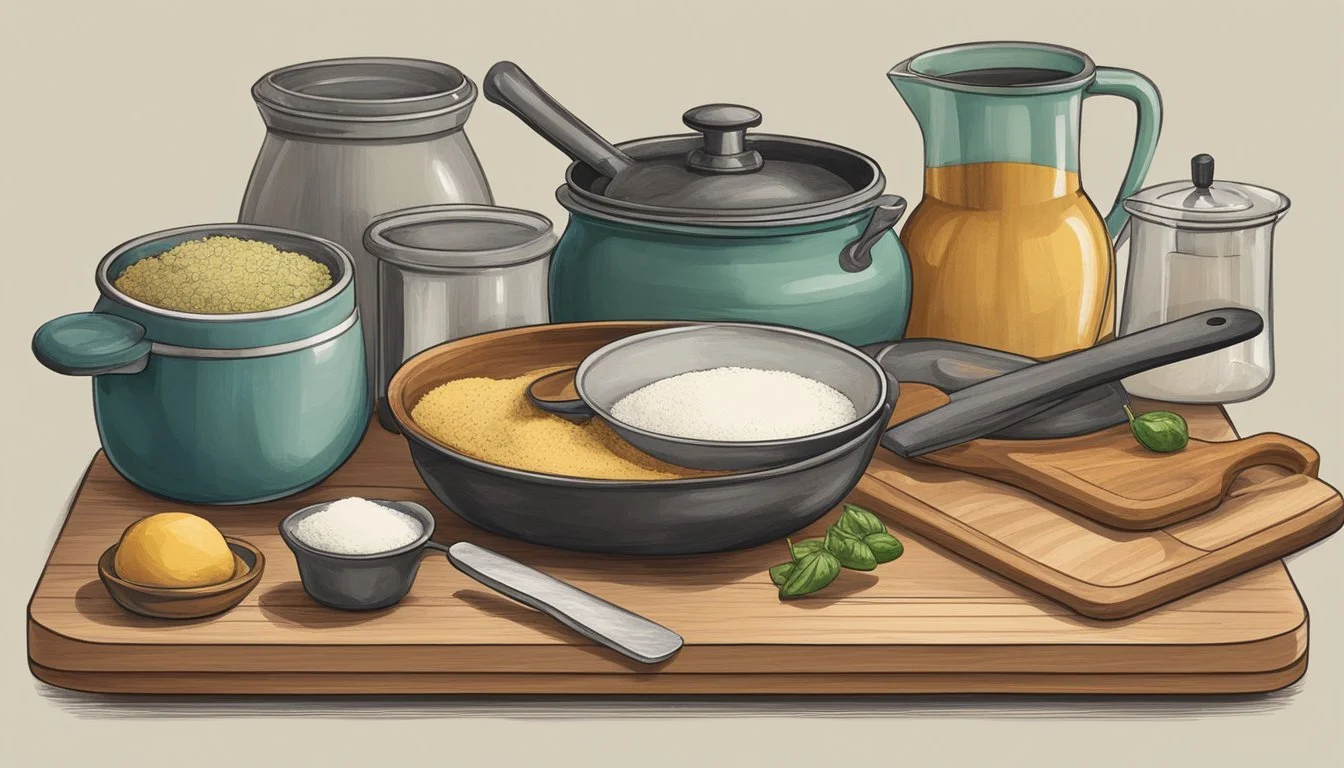Homestead Kitchen Essentials
Tools and Equipment Every Homesteader Needs
Embarking on the homesteading journey transforms the kitchen into more than just another room in the house; it becomes the heart of the homestead. A well-equipped kitchen allows for the efficient production and preservation of food, which is a cornerstone of self-sufficient living. Having the right tools and equipment on hand is crucial, whether preserving the bounty of a summer garden or preparing daily meals from scratch.
The essentials of a homestead kitchen vary according to the specific needs and skills of the homesteader but often encompass a broad range of items from basic utensils to more specialized equipment for food preservation. Items like cast iron cookware are valued for their durability and versatility, while tools such as a kitchen scale play a pivotal role in ensuring recipe precision, especially when dealing with homegrown produce.
Moreover, the consideration for off-grid capability adds another layer of complexity to the selection of kitchen essentials. Manual tools that don't require electricity become significant in scenarios where living off-grid or preparing for potential power outages is a possibility. Equipment like food canners and grain mills are prioritized within an off-grid or self-reliant homesteading context, assuring that food security isn't compromised.
Setting Up the Basics
In the pursuit of self-sufficiency, equipping the homestead kitchen with essential tools and durable cookware forms the foundation. Attention to quality and versatility can dramatically enhance both cooking efficiency and the longevity of your supplies.
Selecting Essential Cookware
For any homestead kitchen, cast iron cookware stands out as a cornerstone for its resilience and heat-retention properties. A well-seasoned cast iron skillet serves multiple cooking methods, from sautéing to baking. Cast iron dutch ovens are equally crucial, offering depth for soups and stews, and the durability to go from stovetop to oven with ease.
Skillets: Vital for frying and searing; invest in various sizes.
Dutch Oven: Perfect for one-pot meals and bread baking.
Griddles: Ideal for pancakes and flatbreads.
Saucepans: Necessary for sauces and small batch cooking.
Stock Pots: Essential for making broths, stocks, and canning produce.
Choosing Quality Knives
A homesteader’s craft is as good as their tools, and quality knives are no exception. One needs a small collection of high-carbon, stainless steel knives that will hold an edge and withstand daily use.
Chef Knife: The workhorse, great for chopping and dicing.
Paring Knife: For precise peeling and trimming.
Bread Knife: With a serrated edge to cut through crusts easily.
Butcher Knife: To efficiently process meat.
Each knife serves a specific purpose, and when chosen well, can last a lifetime with proper care. The initial investment in these knives ensures reliability in food preparation, an important aspect of homestead life.
Advanced Cooking Tools
For the home cook looking to elevate their culinary expertise, integrating advanced cooking tools into their kitchen setup is essential. These tools expand the realm of what can be created at home, offering precision and versatility for complex recipes and techniques.
Integrating Advanced Cooking Tools
When selecting advanced cooking tools, one should consider both their utility and their compatibility with the cooks' overall expertise and needs. A pressure cooker exemplifies efficiency, rapidly cooking meals that would traditionally take hours. Meanwhile, a robust stand mixer not only makes baking a breeze but also serves as a multi-functional appliance with attachments for pasta making, meat grinding, and more.
A Dutch oven brings unparalleled versatility to a homesteader's kitchen. Its ability to go from stovetop to oven makes it indispensable for soups, stews, and artisanal bread. One notable piece that aids in bread making is the bread machine, which automates the process, allowing home bakers to produce fresh bread with minimal effort.
Here's a quick table listing some advanced tools and their uses:
Pressure Cooker: Primary Use - Fast cooking, preserves nutrients
Stand Mixer: Primary Use - Mixing, whisking, kneading
Dutch Oven: Primary Use - One-pot meals, baking bread
Bread Machine: Primary Use - Automatic bread baking
Rolling Pin: Primary Use - Flatten dough
Fermenting Crock: Primary Use - Pickling, fermenting vegetables
Baking Essentials
In the realm of baking, precision is key. A dependable rolling pin proves vital for evenly flattened doughs, essential for pastries and pies. For those passionate about fermentation, a fermenting crock offers a controlled environment for creating sourdough starters, kimchi, or sauerkraut. It is important to note that a gadget like a KitchenAid mixer can transform a kitchen into a professional-grade bakery with its ability to knead dough to perfection.
Food Preservation Techniques
In the world of homesteading, preserving the bounty of the harvest is crucial for sustainability and self-sufficiency. Mastering various food preservation techniques enables one to extend the shelf life of produce, meats, and other food items. These methods not only serve to minimize waste but also to ensure a supply of food throughout the year.
Canning Methods
Water Bath Canning: Ideal for high-acid foods, this method uses a large pot filled with boiling water to process canning jars filled with food such as fruits, jams, jellies, and pickles. Foods are heated to a temperature that destroys harmful microorganisms, and the heat creates a vacuum seal as jars cool, preventing spoilage.
Essential tools:
Canning Kit: Includes jar lifter, canning funnel, lid lifter, and bubble remover.
Water Bath Canner: A large, deep pot with a lid and rack to elevate jars.
Pressure Canning: Necessary for low-acid foods like vegetables and meats, pressure canning employs a pressure canner to achieve higher temperatures than boiling water. Pressure canning is recommended for its ability to destroy botulism spores, which can thrive in low-acid environments.
Essential tools:
Pressure Canner: Specially designed pot that can reach and maintain the appropriate pressure for canning.
Canning Jars and Lids: Specifically designed for withstanding pressure without breaking.
Dehydration Methods
Using a Dehydrator: A food dehydrator is an excellent option for drying fruits, vegetables, herbs, and meats. It circulates warm, dry air to gradually remove moisture while maintaining the food's nutritional value. Dehydration inhibits the growth of bacteria, yeasts, and molds.
Essential tools:
Food Dehydrator: Comes with stackable trays for even air circulation.
Vacuum Sealer: Helps in storing dehydrated foods for longer by removing air from the packaging.
Air Drying: This traditional method involves drying foods in a well-ventilated area with plenty of air circulation. It's more suited for herbs or thin slices of fruits and vegetables, and it's a passive way to dehydrate without needing electricity.
Fermentation Fundamentals
Understanding Fermentation: Fermentation leverages natural bacteria to convert carbohydrates into alcohol or acids. It's a way to not only preserve foods but also to enrich them with probiotics, vitamins, and an enhanced flavor profile.
Essential tools and concepts:
Fermentation Vessels: Containers such as jars or crocks designed for anaerobic fermentation.
Airlocks or Weights: Devices or weights to keep the food submerged in brine and to allow gases to escape without letting contaminants in.
Each of these preservation methods requires a different set of tools and equipment, and the chosen method often depends on the type of food being preserved, the desired shelf life, and the resources available. Whether it's creating luscious jams and jellies through canning, making nutrient-dense snacks with a dehydrator, or enjoying the tangy taste of fermented vegetables, these preservation techniques are essential for any homestead kitchen.
Preparation Tools
Preparation tools are the cornerstone of an efficient homestead kitchen, making the process of cooking from scratch both streamlined and enjoyable. Quality mixers, processors, and cutting tools are essentials.
Mixers and Processors
Mixers and food processors are vital for a variety of kitchen tasks, from making dough to pureeing soups. A robust stand mixer is ideal for heavy-duty mixing tasks, like kneading bread or pizza dough, and can often be supplemented with attachments such as a meat grinder or pasta maker. For quicker, everyday tasks, a standard food processor excels at chopping vegetables, blending dressings, and even making pie crusts with ease.
Chopping and Cutting
When it comes to chopping and cutting, a good set of knives is non-negotiable. This set should include a versatile chef's knife, a precision paring knife, and a sturdy knife set for various tasks. For efficiently prepping large quantities of vegetables, consider adding a spiralizer to create vegetable noodles or garnishes quickly. Regular sharpening is essential to maintain the effectiveness and safety of these cutting tools.
Additional Kitchen Essentials
In a homestead kitchen, certain gadgets and measuring tools are indispensable for efficient food preparation. These essentials contribute to precise cooking methods and enhance the overall functionality of the kitchen space.
Assorted Kitchen Gadgets
A homesteader's kitchen brims with activity, and having the right gadgets at hand makes all the difference. A robust whisk is key for baking, ensuring that ingredients are thoroughly mixed. For dough preparation, a sturdy rolling pin is essential, easing the process of shaping and flattening dough. Additionally, a coffee grinder is not just for coffee beans; it can also be used to freshly grind spices and herbs, releasing their full aroma and flavor.
Essential Gadgets:
Whisk - for combining ingredients smoothly.
Rolling Pin - indispensable for dough work.
Coffee Grinder - versatile for grinding more than just coffee.
Aprons provide a barrier against spills and splatters, keeping one's clothing clean during the culinary process. Having a grain mill onsite allows for the milling of fresh grains, leading to more nutritious and flavorful flour in baking ventures.
Measuring and Weighing
Precision is paramount when following recipes, especially when baking. A kitchen scale is a vital tool, used for weighing produce, ingredients, and especially important for baking where exact measurements can be critical for the desired outcome.
Weighing Tools:
Kitchen Scale - for precise ingredient measurement.
Measuring cups and spoons are also necessary to measure ingredients that aren't weighed. These tools should come in various sizes to accommodate different components across various recipes.
By integrating these tools into their collection, homesteaders can greatly enhance the functionality and versatility of their kitchens, leading to superior culinary results.
Gardening and Outdoor Equipment
The success of a homestead is often tied to the quality and suitability of its outdoor equipment. For the homesteader, having the right tools for gardening and outdoor cooking not only increases efficiency but also enhances the overall self-sufficiency of the homestead.
Outdoor Cooking Accessories
For those who appreciate the value of cooking in the open air, grills and solar ovens are indispensable on a homestead. A durable grill offers versatility, allowing one to prepare a variety of foods using different techniques. Conversely, a solar oven is an eco-friendly option, leveraging sunlight to cook and bake without the use of fuel. Both tools expand the homesteader's capabilities for food preparation and preservation.
Grill: Essential for barbecuing and grilling various foods.
Solar Oven: Harnesses the sun's energy, ideal for baking and slow cooking.
Gardening and Harvesting Tools
A thriving garden requires a collection of tools designed for planting, maintenance, and harvesting. Sturdy rakes, a reliable tiller, and a well-maintained tractor (if the homestead is large enough to necessitate one) form the backbone of any serious gardening endeavor. Furthermore, mason jars are essential for preserving the yield, while a rope is a versatile tool that can support various tasks around the homestead, from training plants to securing equipment. Last but not least, a compost bin is crucial for turning organic waste into rich soil, closing the loop of sustainability on the homestead.
Tiller: Breaks up soil, fundamental for preparing planting beds.
Tractor: Critical for larger homesteads to manage land and assist with heavy lifting.
Rakes: Useful for gathering leaves and debris, spreading mulch, and leveling soil.
Mason Jars: Vital for canning and preserving garden produce.
Rope: Serves multi-functional purposes across the homestead.
Compost Bin: Converts organic waste into nutrient-rich compost for the garden.
Utility Tools and Equipment
In any homestead kitchen, utility tools and equipment are indispensable for ensuring that maintenance, repairs, and power needs are adequately addressed. These items not only guarantee that everyday tasks are performed efficiently but also that the kitchen remains operational in various scenarios.
Maintenance and Repairs
For routine maintenance and immediate repairs, a well-stocked toolbox is essential. It should include a durable hammer for general use, a dolly to assist in moving heavy appliances, and various types of saws. For woodcutting needs, both a handheld saw and a more robust chainsaw may be required, while a specialized meat saw is particularly beneficial for those who process their own game or livestock.
Toolbox Essentials:
Hammer
Dolly
Variety of Saws (including Chainsaw and Meat Saw)
Power and Energy Solutions
Reliable power sources are critical in homestead kitchens, especially in remote locations or during outages. A generator provides a backup power supply, ensuring that refrigerators, freezers, and other appliances continue to function. For a sustainable and environmentally friendly option, solar panels offer a means to harness natural energy. When using any power equipment, having an extension cord of adequate length and durability is crucial for safety and convenience. For outdoor maintenance, a well-maintained lawn mower or lawnmower ensures that the surrounding homestead is kept orderly.
Power Equipment:
Generator
Solar Panels
Extension Cords
Lawn Mower (or Lawnmower)
By incorporating these utility tools and power solutions, homesteaders can maintain a functional and resilient kitchen environment.




